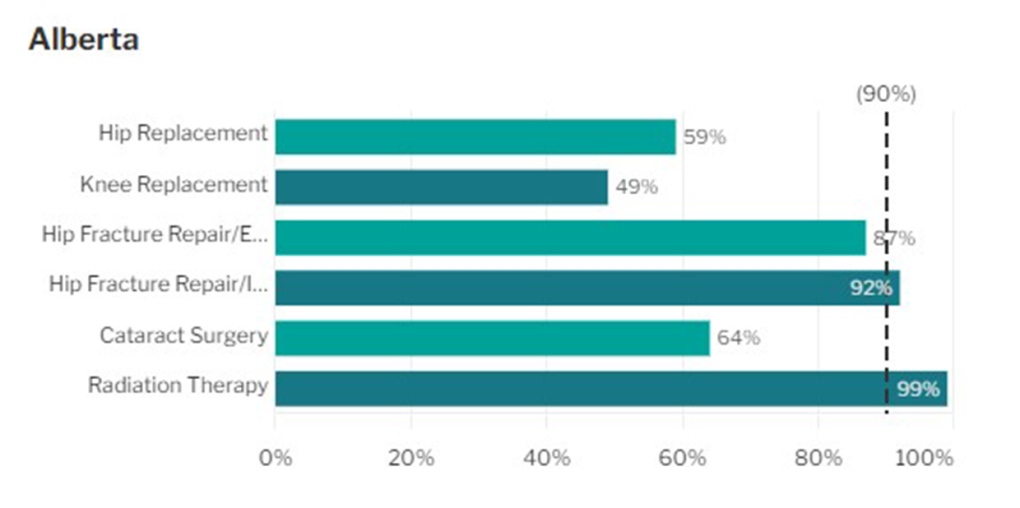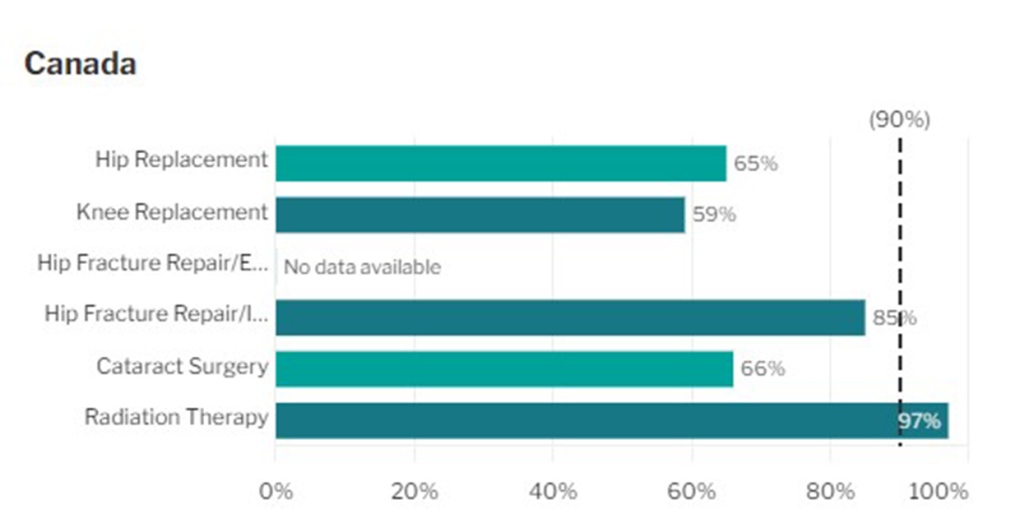Albertans still face lengthy delays for knee, hip replacements: report
Wait times for elective surgeries in Canada have improved compared to the start of the pandemic but a new study shows Albertans are still facing significant delays for knee and hip replacements.
Fifty-nine percent of Albertans waiting for a hip replacement received one within the recommended six-month timeframe given by a surgeon, compared to 65 per cent nationally.
As for knee replacements, less than half of Albertans on the waiting — 49 per cent — received a knee replacement in the same timeframe, compared to 59 per cent for the rest of Canada.
 CIHI's percentage of patients treated in Alberta within benchmark, 2021.
CIHI's percentage of patients treated in Alberta within benchmark, 2021.
 Percentage of Canadian patients treated within benchmark, 2021. (CIHI)
Percentage of Canadian patients treated within benchmark, 2021. (CIHI)
Tracy Johnson, the director of health system analytics with CIHI, says staffing is a major problem plaguing all provinces.
"Prior to the pandemic we had an aging workforce and the pandemic has exacerbated or increased the number of people leaving the workforce to retire or they're plain tired," said Johnson. "So it's finding people. It’s not that big of a challenge to increase the number of surgeries but finding people to do those surgeries and support people in their care after those surgeries (is difficult)."
Elective surgeries, including joint replacements, were cancelled at different waves of the pandemic as the health-care system struggled under the weight of COVID-19.
According to the report, around 600,000 fewer surgeries were performed across the country since the start of the pandemic, with joint replacements and cataract surgeries making up about 25 per cent of the total reduction.
"If you’re not able to work that has an economic impact," explained Johnson. "There's a psychological and an economic and a physical impact of waiting for these surgeries or having them delayed."
Steve Buick, press secretary for Alberta's health minister, says the province is preparing to announce new contracts for hip and knee replacement to increase volumes, reduce wait times and expand capacity in hospitals and chartered surgical facilities.
He says the current waiting list for surgeries in Alberta is less than 73,000 compared to 82,000 at the peak experienced last fall.
"Scheduled surgery has been disrupted in every province, but we've learned along the way and done better recently. We've avoided across-the-board surgery reductions this past winter and, as a result, the overall waiting list is actually coming down.
"We’ve cut wait times for cataract surgery almost in half in the past year, from 19 weeks to 10, the shortest it has been in seven years."
In April, Alberta announced AHS would be using chartered surgical facilities in Calgary and Edmonton to provide 35,000 eye procedures in the coming year.
According to CIHI, wait times for MRI and CT scans have also improved since the start of the pandemic with an additional 9,000 CT scans compared to last year and 20,0000 MRIs.
"There has been quite a ramp up in them. The typical wait times is now 13 days for a CT scan and 45 days for an MRI and that is improved. That’s about a half of that it was in 2019," said Johnson.
CTVNews.ca Top Stories

More than 115 cases of eye damage reported in Ontario after solar eclipse
More than 115 people who viewed the solar eclipse in Ontario earlier this month experienced eye damage after the event, according to eye doctors in the province.
Toxic testing standoff: Family leaves house over air quality
A Sherwood Park family says their new house is uninhabitable. The McNaughton's say they were forced to leave the house after living there for only a week because contaminants inside made it difficult to breathe.
Decoy bear used to catch man who illegally killed a grizzly, B.C. conservation officers say
A man has been handed a lengthy hunting ban and fined thousands of dollars for illegally killing a grizzly bear, B.C. conservation officers say.
B.C. seeks ban on public drug use, dialing back decriminalization
The B.C. NDP has asked the federal government to recriminalize public drug use, marking a major shift in the province's approach to addressing the deadly overdose crisis.
OPP responds to apparent video of officer supporting anti-Trudeau government protestors
The Ontario Provincial Police (OPP) says it's investigating an interaction between a uniformed officer and anti-Trudeau government protestors after a video circulated on social media.
An emergency slide falls off a Delta Air Lines plane, forcing pilots to return to JFK in New York
An emergency slide fell off a Delta Air Lines jetliner shortly after takeoff Friday from New York, and pilots who felt a vibration in the plane circled back to land safely at JFK Airport.
Sophie Gregoire Trudeau on navigating post-political life, co-parenting and freedom
Sophie Gregoire Trudeau says there is 'still so much love' between her and Prime Minister Justin Trudeau, as they navigate their post-separation relationship co-parenting their three children.
Last letters of pioneering climber who died on Everest reveal dark side of mountaineering
George Mallory is renowned for being one of the first British mountaineers to attempt to scale the dizzying heights of Mount Everest during the 1920s. Nearly a century later, newly digitized letters shed light on Mallory’s hopes and fears about ascending Everest.
Loud boom in Hamilton caused by propane tank, police say
A loud explosion was heard across Hamilton on Friday after a propane tank was accidentally destroyed and detonated at a local scrap metal yard, police say.






























